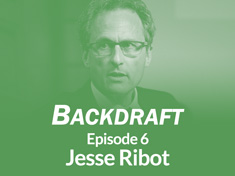-
Backdraft #6: Jesse Ribot on Why It’s So Important for Climate Interventions to Work Through Local Democracy
April 7, 2017 By Lauren Herzer Risi In a research project spanning more than two dozen case studies on environmental governance in 13 sub-Saharan African countries, Jesse Ribot, professor at the University of Illinois, and colleagues found that while many forest management projects claimed to be working with communities, they were in fact undermining local democracy in various ways.
In a research project spanning more than two dozen case studies on environmental governance in 13 sub-Saharan African countries, Jesse Ribot, professor at the University of Illinois, and colleagues found that while many forest management projects claimed to be working with communities, they were in fact undermining local democracy in various ways.In a research project spanning more than two dozen case studies on environmental governance in 13 sub-Saharan African countries, Jesse Ribot, professor at the University of Illinois, and colleagues found that while many forest management projects claimed to be working with communities, they were in fact undermining local democracy in various ways.
For example, Ribot says in this week’s episode of “Backdraft” that REDD, REDD-readiness, and other forest governance projects often circumvented locally elected officials for the sake of convenience and in response to pressure for quantifiable results. The workarounds were done “almost systematically, and not in ways that were subtle.”
Why does this matter? Local democratic processes are “the nursery of democracy,” says Ribot. “People learn democratic process in local democracy and they go other places within their country and up the hierarchy.” When you have a system of decision-making that is accountable to the people, you have greater equity and stronger outcomes for the population.
“People learn democratic process in local democracy”“Legitimacy follows power,” says Ribot, “and if you’re a project and you recognize a local actor as your interlocutor, your local representative, you’re empowering them, and that legitimates them.” Similarly, when development interventions ignore locally elected leaders, they delegitimize them.
Where communities had more than one authority with overlapping responsibilities – e.g., elected local government, customary chiefs, and administrators from central government – development practitioners often chose to work with one of the traditional or centralized authorities over the democratically elected local government. One reason for this was that practitioners operated on the assumption that the customary chief spoke for the people. Digging deeper, Ribot and his colleagues found that while the customary chief often did speak for the people, their opinions were rarely accurately represented. The democratically elected local government was able to more effectively reflect the interests of the people.
Ultimately, regardless of the pressure to produce results that may follow climate mitigation and adaptation programs, Ribot says the process matters.
Rather than the climate event itself, it’s the vulnerability of a community that causes a catastrophe, says Ribot. Often people are not vulnerable to climate events because they lack adaptive capacity, but because of overwhelmed, poor, or exploitive governance. Undermining what democratic governance there is, therefore, is unlikely to produce positive results.
The “Backdraft” podcast series is hosted and co-produced by Lauren Herzer Risi and Sean Peoples, a freelance multimedia producer based in Washington, DC.
Friday Podcasts are also available for download on iTunes and Google Podcasts.
Topics: adaptation, Africa, backdraft, Backdraft podcast, climate change, community-based, conservation, democracy and governance, development, environment, featured, food security, forests, Friday Podcasts, international environmental governance, land, livelihoods, migration, mitigation, natural resources, podcast, protected areas, REDD, risk and resilience
 A Publication of the Stimson Center.
A Publication of the Stimson Center.

 In a
In a 

